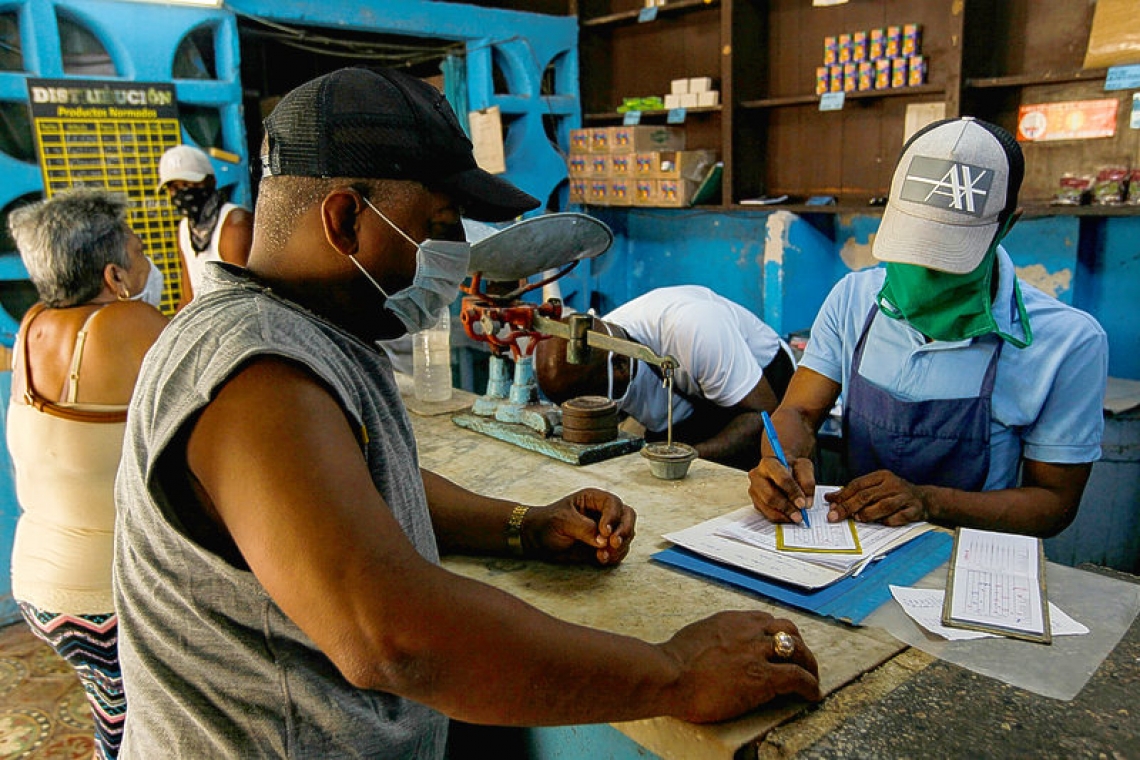HAVANA--Cuba's decades-old rationing system, once slated for elimination, is staging a comeback during the coronavirus pandemic in a bid to prevent Cubans from exposing themselves to the novel virus by going on frantic shopping hunts.
The Communist-run island nation last month closed its borders to travelers, shuttered schools and ordered the use of face masks in a bid to contain the novel virus, sending doctors and medical students to monitor the population. Yet hours-long queues outside Cuban supermarkets due to widespread shortages of basic goods risk undermining the country's response to the spread of the virus, resulting in potential hotbeds of infection.
To combat that, authorities this month added more products to Cubans' monthly ration book -- known locally as the "libreta" -- and started experimenting with online commerce and delivery options. The hope is that shoppers do not travel out of their neighbourhoods to form long lines at stores because they already know they are guaranteed their rations at their local cornershop.
Cuban authorities, who have so far confirmed 1,235 cases of coronavirus and 43 deaths, simultaneously shut down some of the biggest supermarkets and suspended public transport. "Just as it seemed like it was dying out, the libreta has managed to take a new breath of air," said Cuban economist Omar Everleny.
Cuba introduced the "libreta" shortly after the late Fidel Castro's 1959 leftist revolution, to ensure a survival level of heavily subsidized staples like rice, beans, sugar and coffee for everyone in the face of U.S. sanctions. When Fidel's younger brother Raul Castro took over as president in 2008 and started tentatively liberalizing the Soviet-style economy, he called the ration book outdated and went about cutting the number of items that were rationed.
Beyond the few remaining centrally planned economies like Cuba's and North Korea's, rationing is typically only used during war-time, natural disasters or specific contingencies. Raul Castro's aim was to eventually eliminate broad subsidies in favour of more targeted welfare.
Yet shortages of basic goods that have worsened of late due to a decline of aid from ally Venezuela and tighter U.S. sanctions have made it difficult to eliminate the libreta altogether. Panic shopping in view of the pandemic has forced supermarkets worldwide including in some U.S. cities to introduce their own informal rationing by putting limits on the amount of basic supplies like toilet paper and hand sanitizer that shoppers can buy in one trip.
In Cuba, some products such as laundry soap and washing-up liquid are being added back on to the government-issued ration book albeit at market rather than subsidized prices while people are now allowed more rations of chicken. "This chicken means we don't have to go to stand in enormous queues," said Havana resident Margarita Morejon, cutting up chicken in her kitchen. "It's not much but it helps us get by."
Cubans complain the rations are still insufficient and the state, which only started rolling out internet to the public a few years ago, has started opening some virtual stores as another alternative. But its systems crashed in the first week due to the high demand and remain highly unstable even as authorities say they are working on upgrading them.
"I have been trying to pay for my shopping for 72 hours," wrote would-be customer Claudia Valle Perez on the Facebook page of state business corporation CIMEX which runs the virtual stores.
Not all Cubans moreover have a device or the money to access the internet, especially those relying on measly state pensions or wages, like Havana resident Esperanza Moreno, 68, whose pension is equivalent to around $15 per month. She said the old-fashioned libreta is "like a lifeline in these times of virus."







